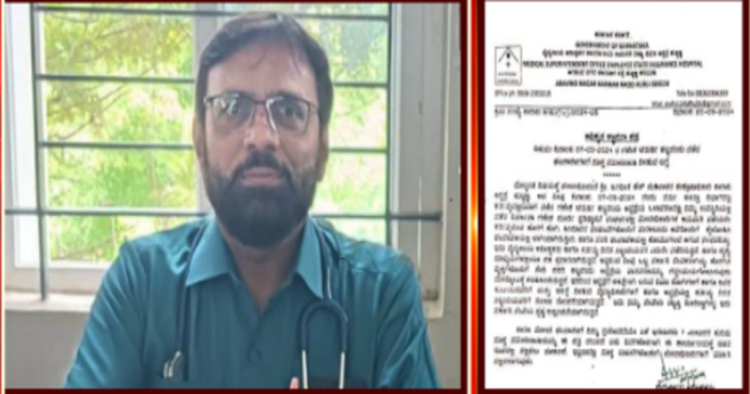Hubli: A fresh controversy has erupted in Hubballi after the conclusion of the Ganesha Mahotsav, centred around the celebration of the festival by government employees at the Employees’ State Insurance (ESI) Hospital. A notice has been issued to hospital staff who, in association with pro-Hindu organizations, participated in the festival, igniting outrage among these groups and sparking a debate over religious freedom and administrative actions.
The situation stems from the actions of ESI Hospital Superintendent Younis Najmi, who allegedly denied permission for the installation of a Ganesha idol within the hospital premises. For the past three years, permission had been granted for the installation of the idol during the Ganesha Festival at the hospital on Karwara Road. However, this year, Najmi’s refusal to allow the installation prompted pro-Hindu organizations to intervene, accusing him of religious bias due to his Muslim faith.
With official permission denied, hospital staff and pro-Hindu organisations took matters into their own hands. They installed and worshiped a Ganesha murti on September 7 in the hospital, leading to a tense situation. Activists from the Bharatiya Janata Party (BJP) and pro-Hindu organisations gathered at the hospital, demanding action against Superintendent Najmi for allegedly restricting the celebration. Amid rising tensions, local police arrived at the scene to defuse the situation.
Once the initial tensions eased, a new twist emerged. A few days later, Superintendent Najmi issued a show-cause notice to hospital staff who had organized the festival. Nurse Jagdish, one of the employees involved in the celebration, was specifically issued a notice on September 20. The notice questioned why action should not be taken against him for his participation and gave him seven days to respond. This administrative action has further fueled the outrage among pro-Hindu activists, who see it as an attempt to suppress their religious expression.
The notice has provoked a strong reaction from local pro-Hindu groups, who argue that the hospital staff were exercising their right to religious expression. They claim the hospital management is targeting employees for celebrating a festival that has been traditionally observed in the hospital for years. The groups accuse Superintendent Najmi of acting with religious prejudice, pointing to his Muslim faith as the reason behind the denial of permission for the Ganesha idol installation.
Activists from these organisations have vowed to continue protesting against what they perceive as religious discrimination in a government institution. They argue that the hospital staff are being unjustly targeted and are demanding that the hospital administration withdraw the notices and allow future Ganesha celebrations without interference.
When approached for a comment, Superintendent Najmi stated that the issue is an internal administrative matter and confirmed that the notices have been brought to the attention of higher authorities. He refrained from providing further details, citing procedural discretion. However, the decision to issue the notices has raised questions about whether the staff are facing disciplinary action for their involvement in religious activities, and if so, whether this constitutes religious bias or an attempt to maintain neutrality in a public institution.
The incident comes at a time when communal tensions over religious festivals are being reported in various parts of Karnataka. While the Ganesha Festival passed peacefully in most areas of Hubballi and Dharwad, this particular incident has reignited concerns over the delicate balance between religious freedom and administrative policy in public spaces.
The controversy has left many questioning the intentions behind Superintendent Najmi’s actions and the legitimacy of the notices issued to the hospital staff. Whether the hospital’s administration will face further scrutiny or resolve the matter internally remains to be seen.
As the situation continues to unfold, it has become a flashpoint for discussions on religious expression in government institutions. The actions taken by Superintendent Najmi, coupled with the reaction from pro-Hindu groups, have brought the issue into the spotlight, raising broader concerns about how religious festivals are managed in public workplaces. Whether this incident leads to further communal unrest or is peacefully resolved will be closely watched in the coming days.













Comments